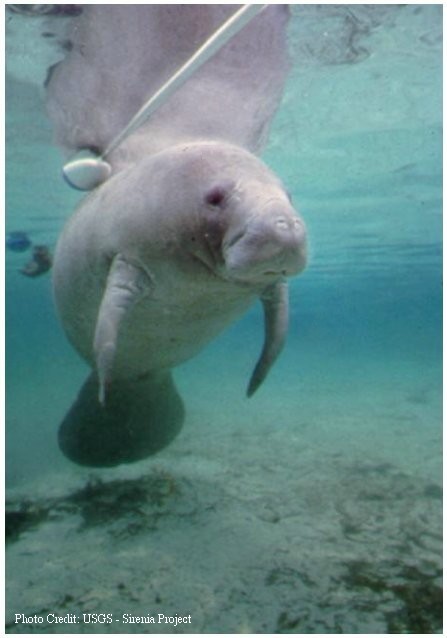|
Why are manatees so FAT?
Manatees really are not fat! The Manatee has no need for fat because it is kept warm in the tropical climates in
which it lives. In fact, compared to other marine mammals, in proportion, manatees have very little fat. They appear to be
fat because of their large gut tract ( Stomach, Intestine, Etc.) which takes up most of the body. (5)
Researchers believe their gut tract is so large because of their diet. Their diet which is completely
herbivorous is very low in nutritional value. Because of the low nutrition in their diet, manatees eat larger quantities of
food to make up for their low nutrition. (5)
To propel the oh
so very interesting life of the manatee, they consume carbohydrates which are then broken down into simple sugars to be used
as energy. Manatees rely on aquatic plants as their source of food. Aquatic plants are not high in carbohydrates. This is
why it is believed that manatees have to eat so much. (6)

|
| Click on picture to view source |
Are manatees capable of sound conduction?
Before I write about this interesting topic, it is important to know the definition of conduction
in the terms I will be using it. Conduction: the carrying of sound waves, electrons, heat, or nerve impulses by a nerve or other tissue. (7)
Recently, scientists
began to question if manatees are capable of sound conduction. The thought arose from knowledge of the squamosal bone (ZPSB)
in the manatee which for various reasons was believed to have the capability of sound conduction. Scientists believed that
manatees could have this function because dolphins have it in their intramandibular fat body (IMFB). To test their theory, samples
were taken from the ZPSB and the IMFB to check the lipid composition. The results showed that most of the ZPSB and IMFB were
composed the same but the IMFB (in the dolphin) had an acid that was not present in the ZPSB (of the manatee). This acid is
believed to be responsible for the conduction in the dolphin. The conclusion was that if manatees are capable of sound conduction,
they have a different "suite" of lipids that control the conduction function. (8)
|

